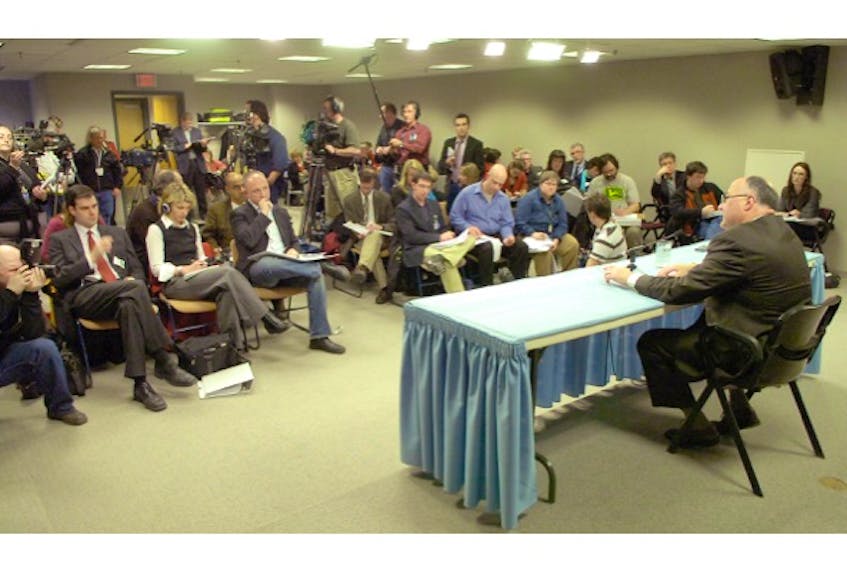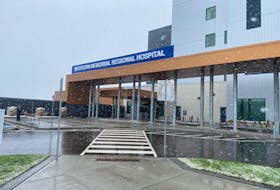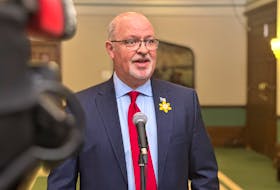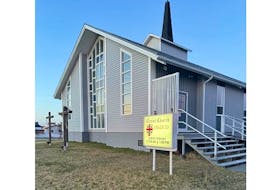ST. JOHN'S, N.L. — A heavy sigh, a catch in the voice, a mention of heightened anxiety — for officials who worked in health care and the provincial government during the era of botched tests at Eastern Health, the Cameron Report and the events leading up to it won’t be forgotten.
For some, it meant the end of a career.
Others moved on.
In hindsight, there is pride that the pathology lab at Eastern Health was revolutionized — the system was changed.
But there’s still chagrin over headline-grabbing testimony that revealed blunders within Eastern Health in terms of disclosing errors to patients and the political fallout once the scope of the errors hit Confederation Building, which itself drew glare over exactly what was known by whom, and when, and who paid close attention to briefing notes.
Justice Margaret Cameron wrote in her 2009 report, “The whole of the health system, to varying degrees, can be said to have failed the (estrogen receptor/progesterone receptor) patients.”
More than 400 breast cancer patients received the wrong results from the hormone receptor testing used to determine treatment options between 1997 and 2005 from the then Health Care Corp. of St. John's, which was amalgamated into the newly created, massive Eastern Health in 2005.
More than 400 breast cancer patients received the wrong results from the hormone receptor testing used to determine treatment options between 1997 and 2005 from the then Health Care Corp. of St. John's, which was amalgamated into the newly created, massive Eastern Health in 2005.
The media broke the story in the fall of 2005 and the communication of the mistakes and new results to the patients became so fraught with delays and misinformation that the debacle ballooned into a scandal, prompting the inquiry to be called in 2007.
The errors should have been flagged years earlier by two cases in which patients sought a second opinion in the United States. Then, in 2003, Dr. Gershon Ejeckam wrote a series of memos that stopped the tests for a time and warned of danger to patient safety.
A summer 2005 internal investigation by pathologist Dr. Bev Carter ended when, frustrated by a lack of resources, she resigned, and eventually a decision was made to send tissue samples to Mount Sinai Hospital in Toronto for retesting.
But it took months, and in some cases years, for patients to get results of the retest. They grew frustrated and angry with the delays and misinformation.
Of the lab situation at the time of the errors, Cameron reported there were no standard operating procedures, quality control was not adhered to and there was no proper validation of equipment.
Cameron’s report also said Eastern Health compounded the scandal with poor communications choices.
She made 60 recommendations and urged that the missteps not go unheeded.
A decade later, Eastern Health’s immunohistochemistry lab is, according to Eastern Health officials interviewed for the first part of this series, a very different place.
A few of those contacted for interviews by The Telegram declined the chance to be heard in this series 10 years after the Cameron Report.
For those who did agree, among the questions they were asked is whether they have any regrets. Here are their stories now.
George Tilley
THEN: CEO of Eastern Health; resigned 2007
NOW: Director of Canadian operations and business development at FONEMED, based in St. John’s
The events that led up to the Cameron Inquiry are never far from George Tilley’s mind, he says.
“Based upon that moment in time, now if you could move the clock ahead six months later, you could say this didn’t turn out like it was expected to with regards to the turnaround time for the retests and the ability to get those who were tested reassessed by the oncologists. That took a lot longer than everybody thought it would. The clock keeps ticking and then it becomes a problem,” he said.
“I think back and say there was a lot of people involved in the discussion and people who said, ‘Well, you know, this is a tough situation. If it goes that route here’s the implication. … This one is worth doing because we think it would wrap it quicker.’ It never happened that way.”
Tilley had risen through the ranks of the Health Care Corp. of St. John’s to the position of CEO, which he kept when Eastern Health was formed with the amalgamation of health-care operations on the east coast of the province.
“I just think it was a high-pressure time. If I think back, we were just created as an organization, now all of a sudden we weren’t just single hospitals. Now we were a health authority and we had Burin, Bonavista and Avalon peninsulas — so, massive restructuring going on and a lot of issues staff were dealing with. And then you had this major critical issue. There’s a lot of us spent our waking hours trying to work on this issue with meeting after meeting with physicians and technologists: let’s get the results.”

He said he was proud of those who buckled down to tackle the problems, but as the stress piled up on staff and patients, it surely wasn’t the way he wanted to end his career.
The same week he left Eastern Health, Tilley found himself back at the Health Sciences Centre with his father, who had a heart attack and cardiac surgery.
It was an emotional time, and staff approached him to offer support.
Tilley says professional opportunities came his way afterward, but he turned them down. Finally, he took the advice of those who said, “George, pull up your socks here and get back on your feet.”
Since leaving Eastern Health, he served as CEO of the Canadian Health Services Research Foundation, as well as the Heart and Stroke Foundation of Newfoundland and Labrador.
Tilley said he didn’t want anything happening on his watch, let alone something of the magnitude of the breast cancer testing errors.
“You can’t help but be impacted by (patients and families) who would have been affected in some way or another in that process,” he said.
“I had spent essentially my full career in the health-care system. We were starting to create a lot of energy in terms of moving forward and trying to deal with fiscal challenges, and at the same grow in terms of diversity of services and the latest technology, and all of a sudden — bango — this situation sort of brings everybody to a halt.”
These days, when Tilley visits family and friends in hospital, he says he feels the system is as good as it is anywhere, with compassionate and conscientious staff. He tries to show his appreciation.
But many people don’t know him anymore — the man who used to be in charge.
“Some people look at me and say, ‘Who’s he?’” Tilley said.
John Ottenheimer
THEN: Minister of Health 2004-06
NOW: Private practice lawyer, Morrow, Morrow and Crosbie, Conception Bay North
John Ottenheimer was only one of the politicians and bureaucrats who got caught in the glare of the Cameron Inquiry.

While it was difficult for everyone involved, particularly the affected patients and their families, and other witnesses, it was necessary and important, he said.
“I believe the people of the province are better and best served by having had the inquiry.”
But there’s one sure thing he regrets.
“One thing in particular, I recall that we, as ministers, we often take the advice of the professionals within the health-care system and that advice is often relied on,” he said. “Clearly it’s a learning experience for everybody. … I suppose, looking back, maybe when an individual is given advice, perhaps it’s incumbent on an individual to dig more deeply and to at least make an effort to ascertain reasons why certain things occur and ask perhaps tougher questions.”
He said that’s a message all politicians should heed.
“Anybody in political life, looking back, perhaps would have asked tougher questions and therefore would have made greater demands on the health-care professionals in a greater effort to understand more fully the circumstances at that time.”
During his time as health minister, Ottenhiemer had a pacemaker installed, and it’s those personal experiences that emphasize how crucial the health-care system is, even with its weaknesses.
“As a patient, I quickly came to realize that we are very fortunate to have the type of health-care system with its professionals that we enjoy here in the province,” Ottenheimer said.
Terry Gulliver
THEN: Director of laboratory services, Eastern Health
NOW: Operator of Trapper John’s Bar, George Street
Terry Gulliver had planned to retire from Eastern Health sometime during his 39th year, but the decision was made at year 30 — and not by him.
“I think I lost my job because of politics,” Gulliver said during an interview in the bar most famous for Screech-ins on George Street.

A lawsuit over the firing more or less fizzled, but Gulliver insists he’ll go to his grave knowing he did his best.
“I really have no regrets in the three-and-half years I dedicated to this whole issue. Me and my staff, we went above and beyond in helping the system identify patients over, at the time, an eight-year period, identify patients who had come through — not just the Health Sciences, but patients across Newfoundland,” Gulliver said, adding he worked 80 hours a week during that time.
“It was a huge endeavour. Myself and the staff involved, we gave it 100 per cent.”
Gulliver was fired days after he finished testifying at the Cameron Inquiry in 2008 and said he never saw it coming.
He’d started at Eastern Health at age 19 after completing a trade school lab technician program and moved up through the ranks, earning the job of director of laboratory services when amalgamation happened in 2005.
Labs in rural areas were in a backward state, said Gulliver.
And then came the discovery of the errors and Eastern Health’s decision not to go public right away.
“I do regret once we knew in June ’05 or early July, we knew for sure we had issues. … At that point they should have went public. There were various groups within the organization who were not ready, dead-set against it. And we had other people who were heavily in favour of going public.”
As he testified at the Cameron Inquiry, he says he thought of his friend, Amy, who died of breast cancer in Detroit, and wondered about cases elsewhere.
“One of the bright things of the inquiry — it wasn’t only Newfoundland that learned from this. It was many, many, many other laboratory medicine programs across North America that learned from this and benefited from this — patients from all over North America would benefit from this inquiry,” Gulliver said.
After being fired, Gulliver said, he was finished in labs in Newfoundland and Labrador. He said he turned down offers elsewhere around the country, but wanted to stay near his parents — both of whom have since died. He said he continued being involved in organizing a national conference — the second he’d chaired for the national association of lab technologists.
When friends who owned Trapper’s were ready to give up, they approached him, Gulliver said.
He likes the work.
Every now and again a former colleague or perhaps a tourist looking to get Screeched-in while in town for work in a related field will drop by the bar and get to chatting.
Sometimes they’ll say, “Oh, you’re that Terry Gulliver,” referring to his time in health care.
Dr. Oscar Howell
THEN: Eastern Health, vice-president medical services, beginning 2006
NOW: Deputy registrar, College of Physicians and Surgeons Newfoundland and Labrador
When Oscar Howell was given the responsibility for diagnostics — laboratory and radiology — it was a tough time for cancer patients, but also for staff who wanted to be confident about their work, he said.

“When you are in the middle, it was very challenging. And you want to be proud of the place where you work, (but) when it's coming out you hurt patients, then that hurts you. And if it doesn’t, you shouldn’t be there,” said Howell.
He had to begin crafting a quality-control system, years later validated with high accreditation status, as well as an independent report reviewing the implementation of the Cameron Report recommendations.
“Eventually, the lab got the highest recognition you can get for quality systems,” he said.
“Where you fall down, you rise up.”
Howell regrets that patients suffered before that happened.
And there’s one other thing he regrets.
And that is the fluctuating number of patients affected by the errors — at one point 383, then later up to 425.
He wishes he had picked up fast enough that people were hand-counting reports and there were multiple databases.
“It drove me mad,” he said.
“The numbers would change and, of course, that created more mistrust of the system. … I think if we had built an automated system earlier on, it would have taken away some of the angst trying to generate the accurate numbers.”
Eventually he brought in IT professionals to build a solid, automated database.
‘They could give me accurate numbers,” he said.
It’s been five years since he changed duties at Eastern Health, and two years since he left the health authority.
The positive story out of the Cameron Inquiry is that quality systems were put in place and they were verified, Howell said.
“Will it prevent errors? It won’t take it to zero. But I tell you it will take it a long way,” he said.
“The other thing is, in the rest of the country this was a big story and it caused a lot of self-reflection in other laboratory systems in the country, and they had to go back and ask themselves some questions. You learn from things that happen in other jurisdictions.”
Dr. Nash Denic
THEN: Clinical chief of laboratory medicine
NOW: Chief medical examiner, Newfoundland and Labrador.
It was one of the most compelling moments of the Cameron Inquiry in 2008.

Dr. Nash Denic broke down on the stand while apologizing to patients.
“To our patients and families, I would like to express my deepest sympathies for the pain that this caused them,” Denic testified. “I still see some of their faces and it was heartbreaking seeing the people affected.”
A decade after the Cameron Report on testing errors was released, the patients are still the first thing Denic mentions.
“We all regret what happened to the patients, and obviously it was very dramatic for the patients because, as physicians, always on our mind are the patients,” Denic said.
“Obviously, this was not intentional harm and some of this was done due to the change of technology and science, because we went back in time. … We know that this issue didn’t just affect Newfoundland. And every single province had the issue going back in time, but we were the only ones who went back 10 years looking into this case and trying to help the patients.
“It was hard on everybody, but it was harder on — obviously — the patients and their families. Everybody got out scarred from that period of time, you know, including myself. … Working in the lab, that never died out, really.”
But he says technology and science have changed radically since that time, as have lab standards.
“The lab is now fully accredited to the highest standards in Canada and the world,” he said.
“We are proud of it. Every single aspect of the lab has been improved.”
Twitter: @BarbSweetTweets
RELATED
• CAMERON REPORT: Breast cancer testing scandal propelled passionate activism
- CAMERON REPORT: Donna Howell’s family left feeling shortchanged, 10 years after breast cancer testing scandal
- CAMERON REPORT: Families, patients reflect on cancer screening scandal
- CAMERON REPORT: Elizabeth Finlayson remembered by her daughters
- CAMERON REPORT: The breast cancer testing scandal that shocked Newfoundland and Labrador led to sweeping change









